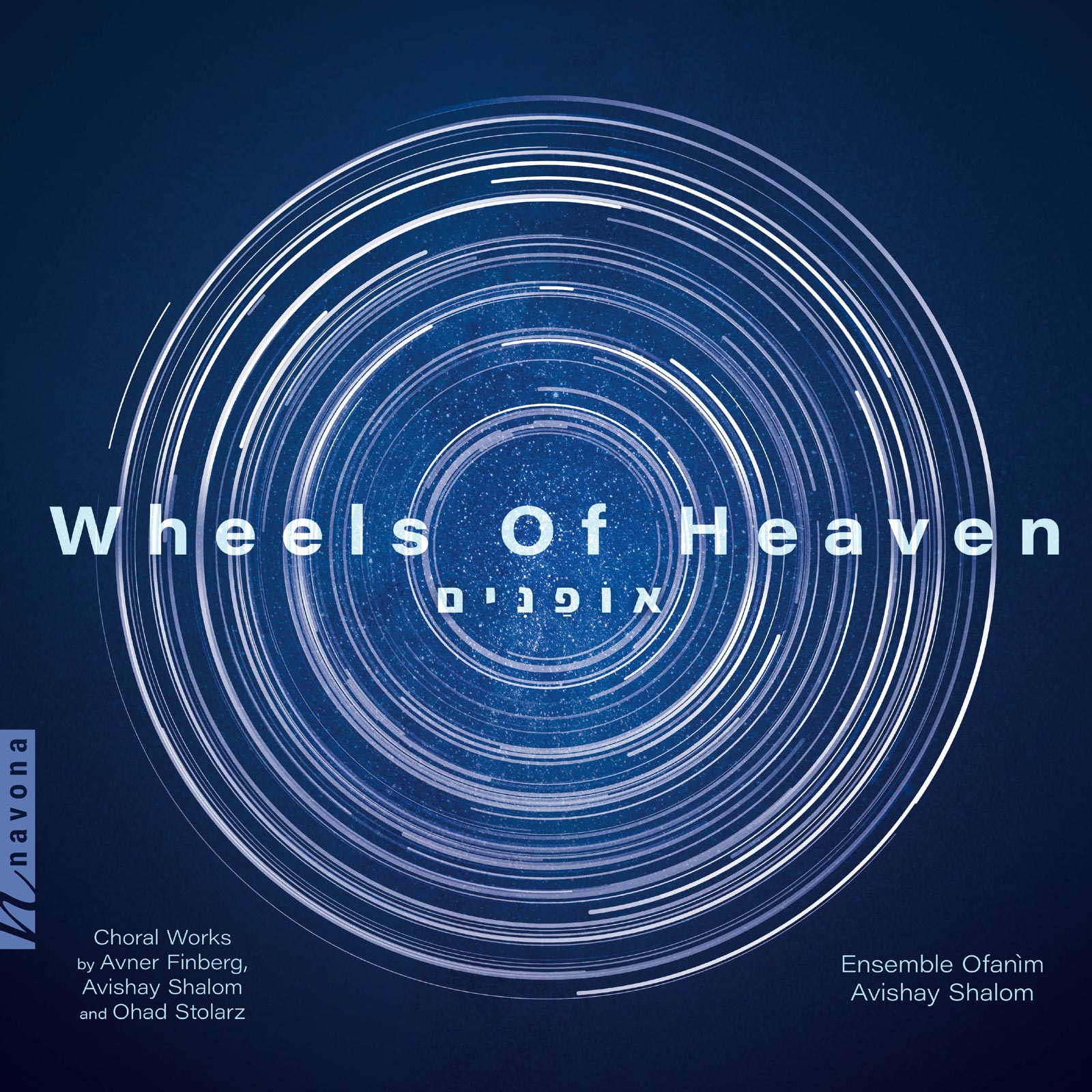Wheels of Heaven
Avner Finberg composer
Avishay Shalom composer
Ohad Stolarz composer
Ensemble Ofanìm | Avishay Shalom conductor
Avner Finberg, Avishay Shalom, and Ohad Stolarz decorate the choral scene in WHEELS OF HEAVEN, a new setting of sacred Hebrew and Aramaic texts admirably performed and recorded by Ensemble Ofanìm. WHEELS OF HEAVEN is a devotion to the literary elements of Hebrew traditions, illustrations of a rich and cherished history. These artists have composed, arranged, and presented a beautiful collection of a vast literary tradition in this release, and the resulting sound is remarkable.
Listen
Stream/Buy
Choose your platform
Track Listing & Credits
| # | Title | Composer | Performer | |
|---|---|---|---|---|
| 01 | Hashkivénu | Avner Finberg | Ensemble Ofanìm | Avishay Shalom, conductor; Gabriel Loewenheim, baritone; Martin Fehlandt, organ | 5:18 |
| 02 | Ofàn | Avner Finberg | Ensemble Ofanìm | Avishay Shalom, conductor | 8:15 |
| 03 | Adòn Hasselichòt | Traditional Sephardic arr. Avishay Shalom | Ensemble Ofanìm | Avishay Shalom, conductor | 3:42 |
| 04 | Ben Adàm, Ma Lechà Nirdàm | Traditional Sephardic arr. Avishay Shalom | Ensemble Ofanìm | Avishay Shalom, conductor | 4:00 |
| 05 | Osé Shalòm Bimromàv | Nurit Hirsh arr. Ohad Stolarz | Ensemble Ofanìm | Avishay Shalom, conductor; Lior Stern, soprano | 5:08 |
| 06 | Yah Ribbòn Alàm | Traditional Hassidic arr. Ohad Stolarz | Ensemble Ofanìm | Avishay Shalom, conductor | 2:44 |
Ensemble Ofanìm
Soprano
Frieda Jolande Barck • Birita Poulsen • Lior Stern • Liza Steinbock
Alto
Anastasiia Sidorkina • Maria Rüssel • Vizma Zvaigzne • Luise Lein
Tenor
Martin Netter • Martin Fehr • Armin Horn • Rory Wainwright Johnston
Bass
Nico Brazda • Tom Heiß • Till Schulze • Pedro Ometto
Gabriel Loewenheim, solo baritone (Hashkivénu)
Martin Fehlandt, organ (Hashkivénu)
Lior Stern, solo soprano (Osé Shalòm Bimromàv)
Recorded March 14th–16th 2022 at Christuskirche in Oberschöneweide, Berlin, Germany
Recording Session Engineer, Mixing and Mastering Natalia Ervits
Production coordinator Ohad Stolarz
Rehearsal piano Daniel Seeger
Graphic design Yaneev Topyol
Executive Producer Bob Lord
A&R Director Brandon MacNeil
VP of Production Jan Košulič
Audio Director Lucas Paquette
VP, Design & Marketing Brett Picknell
Art Director Ryan Harrison
Design Edward A. Fleming
Publicity Aidan Curran
Artist Information

Avner Finberg
Avner Finberg is an Israeli American composer and violinist. His music reimagines traditional musical forms and ideas using fragments and stylistic references to wide-ranging sources, while also drawing upon cutting-edge contemporary music techniques. Finberg’s debut album, THE FOUR SEASONS OF ISOLATION, was hailed as “intriguing, entertaining and thought-provoking” by Gramophone Magazine. His music was described by the late composer Steven Stucky as “refined, mature work of impeccable technique, original voice, and considerable ambition.”

Ohad Stolarz
Ohad Stolarz was born in 1989 in Tel Aviv, Israel. Since 2013 he has been based in Berlin. In 2014 he founded Hebräischer Chor Berlin, an amateur choir specializing in Hebrew Song, which he conducted until 2017 while contributing a multitude of original choral arrangements and compositions.

Avishay Shalom
Born in Israel in 1984, Avishay Shalom was awarded first prize at the Arthur Nikisch International Conducting Competition 2022 in Sofia, Bulgaria.
From 2015 to 2017 he was musical director of the Graduate Opera Studio at the College Conservatory of Music in Cincinnati, Ohio, where he conducted Monteverdi’s L’incoronazione di Poppea, Rossini’s Il Signor Bruschino, and Conrad Susa’s Transformations.

